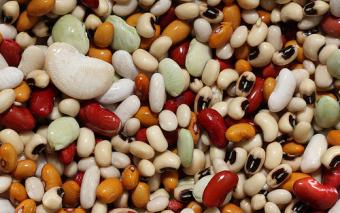High-Protein Vegetarian Foods

Tofu

Greek Yogurt

Beans

Eggs

Cottage Cheese

Quinoa

Lentils

Ricotta Cheese

Nuts and Nut Butters

Milk

© 2025 LoveToKnow Media. All rights reserved.
Carly has a passion for vegetarian food and loves experimenting with new recipes.
Read MoreLearn about our Editorial Policy.

Protein-rich vegetarian foods aren't as rare as their reputation implies. While it's true plant-based foods don't contain as much protein as meats and meat products, you can easily stick to your diet and satisfy daily protein recommendations.

Many people used to think of tofu as a bizarre, exotic food for health nuts. Since then, the soybean-based product has come a long way. It picks up flavors from other ingredients and marinades very successfully, and it's easy to prepare. One 100 g serving of tofu, or about one thick slice, has about 7 g protein.

While most regular yogurt has a maximum protein content of about 10 g per 8-ounce serving, Greek yogurt is thicker, richer, and packs in more than one and a half times that amount. A 6-ounce cup of most nonfat or low-fat varieties of Greek yogurt has between 15 g and 20 g protein.

Beans work fantastically well as a meat substitute in casseroles, soups, and even pasta dishes. If you're pressed for time, use canned, instead of taking the time to soak and boil them. One cup of most cooked beans, including kidney, navy, and Great Northern, has about 15 g protein.

Eggs are another classic source of vegetarian protein. You can scramble 'em, fry 'em, or hard-boil 'em, but any way you do it, you'll be getting about 6 g protein per large egg. Try a two- or three-egg omelet for a quick lunch or dinner; eggs don't have to be just for breakfast!

It doesn't tend to get a lot of press, but cottage cheese is a protein powerhouse; a cup packs in nearly 30 g protein. Considering that, you could simply add a small scoop to some fresh fruit or berries several times throughout the day and make leaps toward your recommended protein quota.

Most whole grains are solid sources of protein, but quinoa is an exceptional candidate because it contains essential amino acids. It's also a snap to prepare: Just rinse, add twice the amount of water as you have grain, and simmer while covered for about 15 minutes. One cup of cooked quinoa has about 8 g protein.

Lentils, like beans, are legumes. Unlike beans, they tend to fall apart when cooked for extended periods of time, making them perfect for savory sauces, thick soups, and warm curries. One cup of cooked lentils has nearly 18 g protein.

Ricotta cheese, the star of lasagna, manicotta, and other traditional Italian dishes, is also a standout source of protein, with the part-skim variety containing more than 14 g per half cup. Try using it as an alternative to cream cheese for a protein-rich, authentic Italian cheesecake.

Peanut butter, almond butter, and whole nuts of all kinds are satiating, tasty sources of protein that make fantastic snacks and lunch components. You can also use nut butters to make savory or sweet sauces and sprinkle plain nuts in salad. Two tablespoons of most nut butters have close to 8 g protein.

No matter what kind you like, whether it's soy or traditional dairy, there's no denying that milk is one of the most versatile and protein-rich vegetarian foods. A cup of skim milk has about 8.5 g protein, and a cup of soymilk has about 7 g.